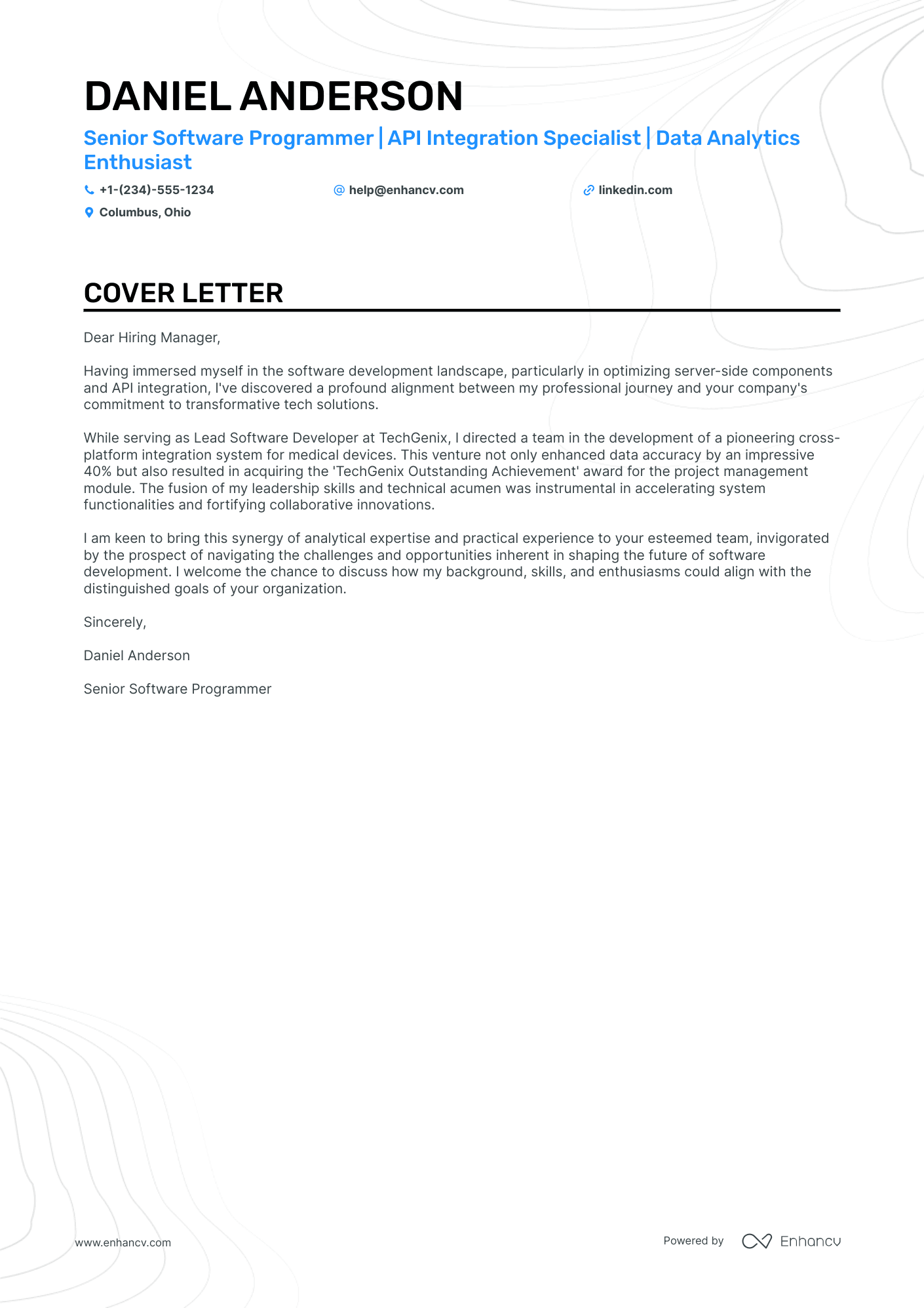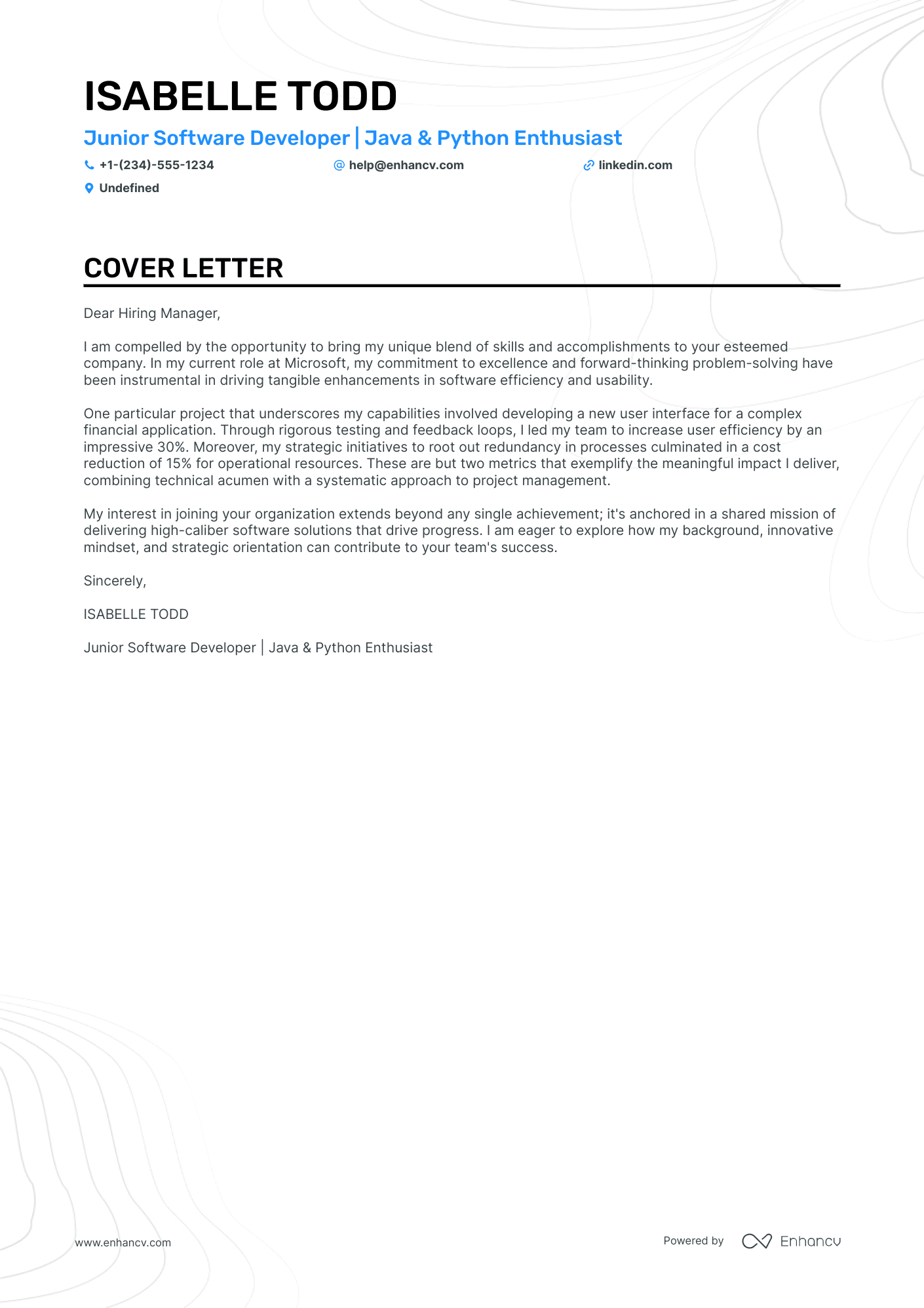Embarking on the job hunt, you've likely realized that a stellar software developer cover letter is just as vital as your resume. It's your chance to share the journey behind your proudest professional triumph, not just repeat bullet points. Crafting this one-page narrative requires a delicate balance of formality and originality, steering clear of overused phrases. Let's dive into how you can encapsulate your unique story, leaving clichés behind and making recruiters take notice.
- Write a software developer cover letter that helps you stand out (and get the job);
- Understand how to start and end your software developer cover letter with the appropriate greeting;
- What to include in the body of your software developer cover letter to put your best foot forward;
- Your most important achievements - how to present them as part of your software developer cover letter.
And if you want to make your life even easier, simply drag and drop your software developer resume into Enhancv's AI cover letter generator, and it will write your cover letter for you in just a few moments.
If the software developer isn't exactly the one you're looking for we have a plethora of cover letter examples for jobs like this one:
Drop your resume here or choose a file.
PDF & DOCX only. Max 2MB file size.
Software developer cover letter example
Daniel Anderson
Columbus, Ohio
+1-(234)-555-1234
help@enhancv.com
- Highlighting specific accomplishments, such as the development of a pioneering cross-platform integration system, can demonstrate a candidate's ability to deliver tangible results and show relevancy to the prospective role.
- Mentioning the recognition received, like the 'TechGenix Outstanding Achievement' award, can lend credibility and show that the candidate's work has been celebrated within the industry.
- Expressing leadership experience, for instance, managing a team, showcases the candidate's potential to handle responsibility and indicates readiness for roles that may require team coordination and guidance.
- Showing an understanding of the company's mission and expressing enthusiasm for contributing to its goals can create a personal connection and suggest a cultural fit that goes beyond technical qualifications.
What are the basics of the design or format of your software developer cover letter?
To start, here's a reminder for you: the Applicant Tracker System (or software that is used to assess candidate profiles), won't be reading your software developer cover letter.
Recruiters enjoy reading software developer cover letters with a standardized format that uses:
- the same font as the resume (e.g. modern ones like Raleway or Volkhov are prefered over the clichéd Times New Roman or Arial);
- single spacing to keep the content concise and organized (this is all ready for you in our cover letter templates);
- a one-inch margin to wrap around the text, like in our cover letter builder;
- PDF as a file format, as it allows your design (and visual element) to stay the same.
Finally, we can't go on without mentioning the key sections of your software developer cover letter.
In the top one-third, make sure to include a header (with your contact information, name, role, and date), a salutation, and an introduction.
Next, follows the heart and soul of your software developer cover letter or its body.
End your software developer cover letter with a closing paragraph and, if you wish, a signature.
Not enough hours in the day? Try our free cover letter generator and get a polished letter in seconds.
The top sections on a software developer cover letter
- Header: Includes your contact information, the date, and the recipient's details, setting a professional tone and providing essential information for the recruiter to reach out to you.
- Greeting: Personalize your greeting by addressing the hiring manager or team leader by name to show you've done your research and are genuinely interested in the position.
- Introduction: Clearly state the job you are applying for, how you found out about the position, and highlight a key achievement or skill that demonstrates your suitability for the role of a software developer.
- Body: Detail your relevant experience and specific technical skills, such as proficiency in certain programming languages or software development methodologies, that align with the job description and show you can meet the demands of the role.
- Closing: End with a strong conclusion that reiterates your interest in the position, invite the recruiter to review your enclosed resume, and propose a next step, such as an interview, to discuss further how you can contribute to the company as a software developer.
Key qualities recruiters search for in a candidate’s cover letter
- Proficiency in relevant programming languages (e.g., Java, Python, C#): Demonstrates the technical skill set required to write and maintain code effectively.
- Experience with software development methodologies (e.g., Agile, Scrum): Shows the ability to follow structured processes for efficient and collaborative software development.
- Problem-solving and analytical skills: Critical for diagnosing and fixing bugs, optimizing code, and developing creative software solutions.
- Portfolio of completed projects: Provides concrete evidence of practical experience and showcases the kind of work the developer is capable of delivering.
- Familiarity with version control systems (e.g., Git): Indicates the ability to work in a team environment, manage code changes, and contribute to shared repositories professionally.
- Strong communication and teamwork abilities: Essential for collaborating with cross-functional teams, understanding user requirements, and articulating technical challenges and solutions.
The software developer cover letter salutation: how to address hiring managers
After covering the format of your software developer cover letter, let's look at the salutation.
Back in the day, the cordial "To whom it may concern" or "Dear Sir/Madam", might have worked out fine.
But, nowadays, your cover letter should approach hiring managers on a more personal basis.
So, what to do about your cover letter salutation?
If you've messaged the recruiters and are on a first name basis or a more formal one, use the hiring manager's name in the greeting (e.g. "Dear Sophie," "Dear Ms. Givens", or "Dear Mr. Everett,").
Always aim to make the effort to find out the name of the hiring manager, who'd be assessing your application. Search on LinkedIn, double-check the advert on the corporate website, or message the brand on social media to find out more about the role.
If you can't find the hiring manager's name (and still want to sound professional), use "Dear HR Team,", "Dear Hiring Manager,", or the likes.
List of salutations you can use
- Dear Hiring Manager,
- Dear [Company Name] Team,
- Dear [Department] Department,
- Dear Mr./Ms. [Last Name],
- Dear [First Name] [Last Name],
- Attention: [Specific Role Title] Hiring Team,
Using your software developer cover letter intro to show your dedication
We know just how difficult it is to start writing your software developer cover letter introduction.
There are so many great qualities you have as a professional, which one should you choose?
How about writing up to two sentences about your passion and commitment to the work you do or are set to do?
Try to describe exactly what you enjoy about the potential role.
A positive attitude from the get-go will help you stand out as a motivated software developer professional.
What comes next: your software developer cover letter middle paragraphs
In the next three to six paragraphs (or the body of your software developer cover letter) you have to prove your unique value.
Most candidates tend to mess up at this stage. They tend to just copy-paste information from their resume.
That's one big no-no.
Remember that when writing your software developer cover letter, it has to be personalized. And, your ultimate aim is to catch the recruiter's eye.
So, look back on key job requirements and write down a list that includes the ones you cover.
Next, select just one key achievement from your professional (or personal) history that meets those advert keywords.
Narrate a story around how you've grown your skill set and knowledge. Also, aim to show the unique understanding or soft skills you bring about, thanks to your past success.
Ending your software developer cover letter: a closing paragraph with a promise
If you're thinking of finishing your software developer cover letter with a "Sincerely yours" or "Thanks for the consideration," you need to read on.
End the final paragraph of your software developer cover letter with a twist:
- a promise - of how you'd grow as a professional, part of the company, or improve organizational metrics;
- a call to action - prompt interviewers with some follow-up actions if they are interested in your profile.
A personalized ending would surely help you to stand out by being a memorable candidate.
Is it beneficial to mention that you have no experience in your software developer cover letter?
Lacking professional experience isn't the end of the world for your software developer cover letter.
Just be honest that you may not have had roles in the industry, but bring about so much more.
Like, your transferable skills, attained thanks to your whole work and life experience (e.g. the skills your summer spent working abroad taught you).
Or, focus on what makes you, you, and that one past success that can help you stand out and impress recruiters (think of awards you've attained and how they've helped you become a better professional).
Alternatively, write about your passion and drive to land the job and the unique skill set you would bring to enhance the workplace culture.
Key takeaways
Summarizing the most important aspects in writing your software developer cover letter, remember to:
- Create a personalized software developer cover letter for each role you apply for, that includes the recruiter's name in the salutation;
- Format your software developer cover letter with single-spacing, one-inch margins, and a modern, yet ATS-friendly font;
- Always start off your software developer cover letter with two sentences that reflect what is most important about your application;
- Your software developer cover letter body should feature your biggest accomplishments and the job-relevant skills it has taught you;
- Instead of opting for the "Sincerely yours" ending, close your software developer cover letter with a nod to the future with what you aim to achieve in this potential role.
Software Developer cover letter examples
By Experience






